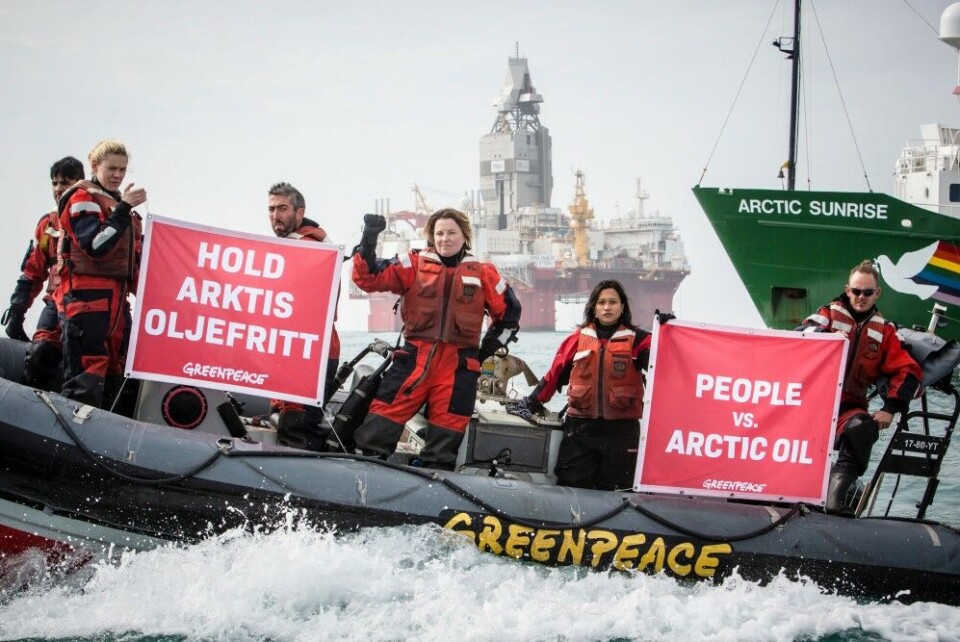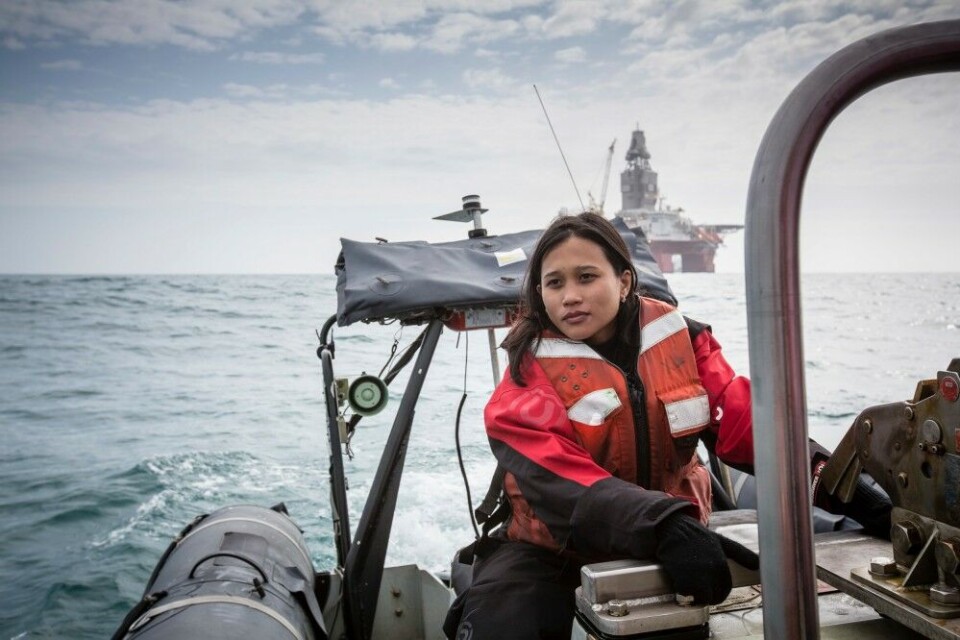
Joanna lost most of her family in a typhoon said to be caused by climate changes. Today, she protests Statoil’s Barents Sea oil drilling
Joanna Sustento from the Philippines joins Greenpeace when protesting Norway’s Arctic oil exploration.
For the first time since arrested by the Russian Coast Guard in 2013, Greenpeace’s vessel “Arctic Sunrise” is back in the Barents Sea. On Friday, Statoil’s rig “Songa “Enabler” was visited by the activists.
“Songa Enabler” is engaged in exploratory drilling at the Gemini North field.
Greenpeace has urged a halt to the drilling the field that was awarded to Statoil shortly after Oslo signed the Paris Climate Agreement.
“All new oil exploration must be halted, in particular in sensitive and costly environments as the Arctic, as the world has already found more fossil fuels than we can afford to burn within the climate targets agreed in Paris,” says Truls Gulowsen, head of Greenpeace Norway.
Together with the environmentalists protesting Statoil’s drilling in the Barents Sea on Friday are climate change survivor and activist Joanna Sustento from the Philippines, and actress and activist Lucy Lawless from New Zealand.
In 2013, Joanna Sustento lost her entire family, except for her brother, to super-typhoon Haiyan, which also left large parts of her hometown, Tacloban, in ruins.
Today, 25-year-old Joanna Sustento says it is hard to grasp and accept that a government like Norway’s is opening up new Arctic oil drilling, knowing full well it will put families and homes in other parts of the world at risk.
“I’m here in the Arctic to see this irresponsibility with my own eyes; share my story about the human consequences of climate change; and call on the Norwegian government to put a stop to this dangerous search for new oil,” Sustento says.
She says it is scary to think that super-typhoons could become the new normal.
“I couldn’t stop the typhoon that destroyed my home, but Norway could play a role in curbing the severity and frequency of these storms right now. It gives me hope to see that right now people are taking peaceful action for the climate all over the world and holding governments accountable,” says Sustento.

Typhoon Heiyan was responsible for more than 6,300 lost lives and over four million displaced citizens in the affected Philippine villages.
The Global Climate Risk Index 2015 listed the Philippines as the number one most affected country by climate change, using 2013’s data.
Greenpeace and the Norwegian organisation Nature and Youth, have filed a lawsuit against the Norwegian government, arguing that the new oil licenses violate both the Paris Climate Agreement and paragraph 112 of the Norwegian Constitution, which commits the government “to safeguard the people’s right to a clean and healthy environment for future generations.”
More than 250,000 people have added their names to support the climate lawsuit, and these witness statements will be used to support the case in court.
Among the Greenpeace protesters in the Barents Sea is also actress Lucy Lawless from New Zealand.
“I can’t stand by, doing nothing, when we know beyond a doubt that we can’t burn a single barrel of oil from a new well if we are to avoid a climate catastrophe. I don’t ever want to look my kids in the eye and explain why I didn’t do all I could to protect them from climate change. It is beyond my understanding that the Norwegian government is giving Statoil a ticket to drill like mad at the expense of future generations,” says Lucy Lawless.
Statoil’s rig “Songa Enabler” is currently looking for new oil at the Gemini North license, and is expected to continue to the Korpfjell license later this summer. Both licenses were awarded in the 23rd licensing round that is subject of the court case filed by Greenpeace and Nature and Youth, scheduled for hearing on November 14th, 2017.
Statoil and the Norwegian government have decided to go ahead with the drillings despite the legal dispute.
You can help us…
…. we hope you enjoyed reading this article. Unlike many others, the Barents Observer has no paywall. We want to keep our journalism open to everyone, including to our Russian readers. The Independent Barents Observer is a journalist-owned newspaper. It takes a lot of hard work and money to produce. But, we strongly believe our bilingual reporting makes a difference in the north. We therefore got a small favor to ask; make a contribution to our work.
















